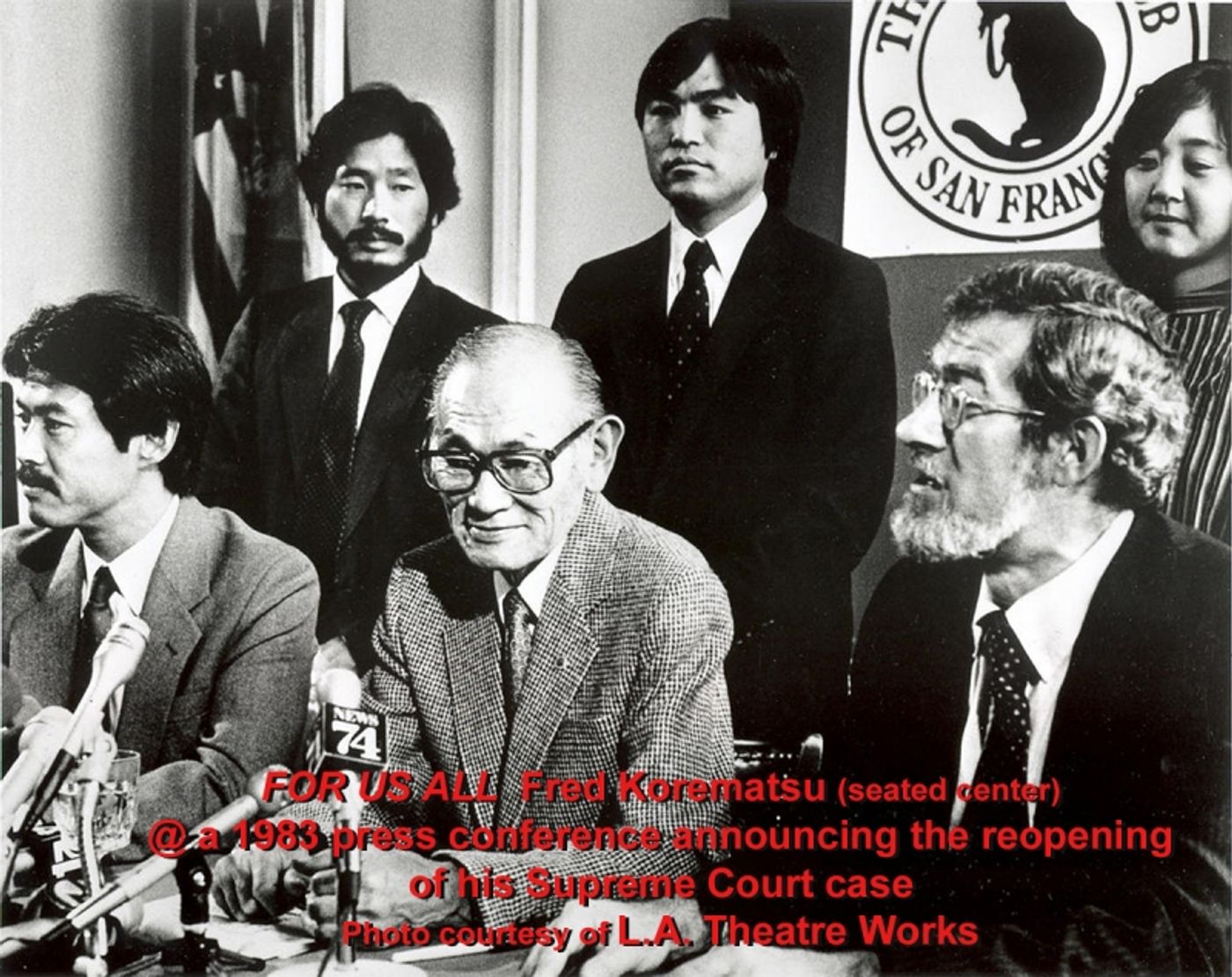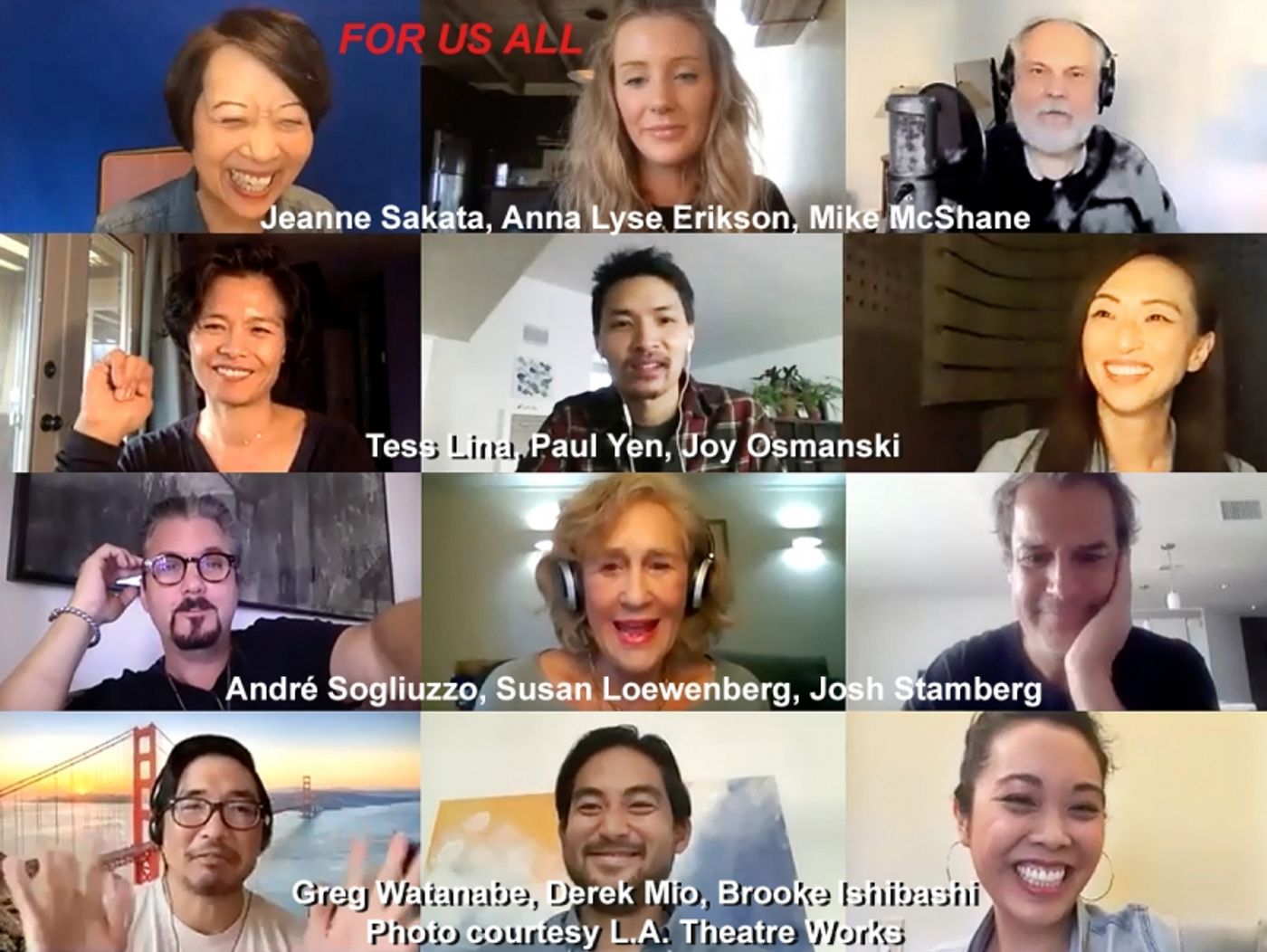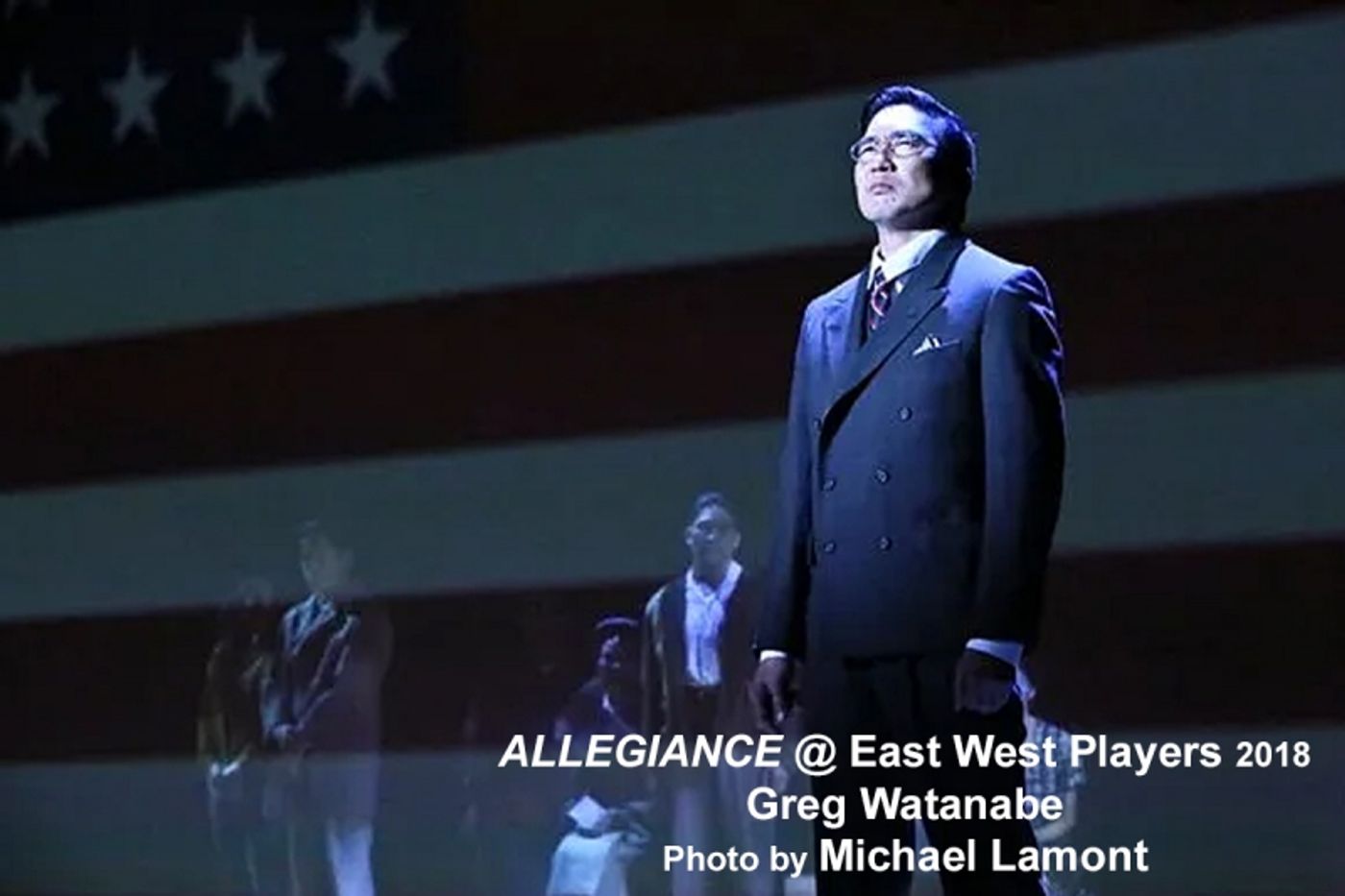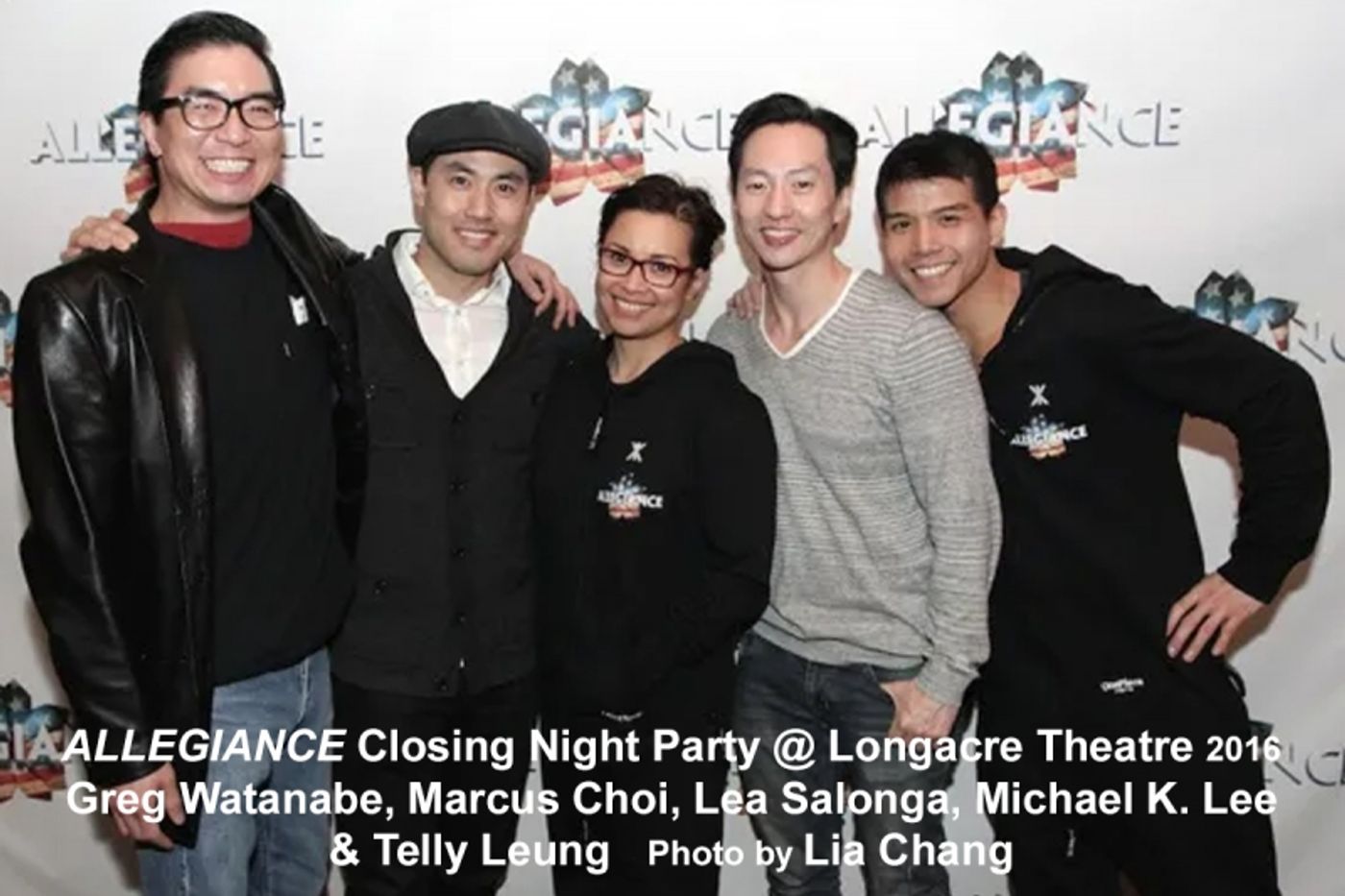Interview: Greg Watanabe – A NO-NO BOY FOR US ALL
In sync with Asian American and Pacific Islander Heritage Month, L.A. Theatre Works will be releasing Jeanne Sakata’s FOR US ALL and Ken Narasaki’s NO-NO BOY

In sync with Asian American and Pacific Islander Heritage Month, L.A. Theatre Works will be releasing two audio theater recordings about the horrific Japanese American experience during World War II - Jeanne Sakata's FOR US ALL and Ken Narasaki's NO-NO BOY. FOR US ALL's available for purchase now, with NO-NO BOY on May 15, 2021. Anna Lyse Erikson directs both show's large ensemble casts, with Greg Watanabe voicing the lead characters in both.
Thank you for taking the time for this interview, Greg!
What cosmic force first brought you together with L.A. Theatre Works?
My first experience with L.A. Theatre Works was while I was still living in the Bay Area. I had worked on the premiere of BALLAD OF YACHIYO at Berkeley Rep, and later at Seattle Rep and the Public in NYC, and happily L.A. Theatre Works hired me to work on their recording/production. That they chose Philip Kan Gotanda's play and more recently his SISTERS MASTUMOTO, I guess would be the first "cosmic force," and led to my connection to L.A. theater folks like Tim Dang who directed SISTERS MASTUMOTO and also VIETGONE for L.A. Theatre Works.
Both plays you're in, deal with the aftermath of the Japanese internment camps during World War II. Do you personally know of friends or family who endured this unconscionable ordeal?
My mom's family was in Hawaii when the war started, but my dad's family was living in L.A. They got removed to the Heart Mountain concentration camp in Wyoming. Eventually, they got work release prior to the end of the war to go live in Denver, which is where my dad was born. Eventually, they made their way back to Boyle Heights, so that's where my dad grew up.
I've worked on a number of plays that deal with the camps and the impacts on our communities, and, over the course of time, have met and spoken to a number of folks about their experiences including those who are direct survivors.
Do you do additional research on this topic for these plays? Recommend any enlightening books on those dark times?
 I've done research over time, so it seems to accumulate, but I guess I'd recommend one of Jeanne Sakato's inspirations: Peter Iron's Justice at War: The Story of the Japanese American Internment Cases.
I've done research over time, so it seems to accumulate, but I guess I'd recommend one of Jeanne Sakato's inspirations: Peter Iron's Justice at War: The Story of the Japanese American Internment Cases.
I really love Densho.org. They curate a website with a lot of information about the camp experiences. They have done a lot of interviews with survivors and are a tremendous resource.
Nikkei for Civil Rights and Redress is an activist community organization that fought for the commission hearings and later redress. They still are active in fighting for justice, connecting the Japanese American wartime experience to other communities' fights for justice (https://ncrr-la.org). They have a number of resources available including video of some testimony from Japanese Americans at the CWRIC hearings, some people speaking in public for the first time about their experiences. It's very powerful.
Would you give a three-line pitch for FOR US ALL and NO-NO BOY?
This is a great pairing of plays. NO-NO BOY is such a seminal novel. It's really hard to explain how hard it was, has been, for Japanese Americans to talk about and deal with their experiences with camp, and especially so for those who were no-no's or draft resisters, but NO-NO BOY and Ken's adaptation does a great job of giving a sense of what it may have felt like for some of these Japanese Americans.
And FOR US ALL tells a story about such an important moment in not just Japanese American history, but American history. Imagine, young Nisei, second generation Japanese Americans, standing up and taking the U.S. government to court for having wrongly incarcerated them and their families. And then losing in the Supreme Court. All of them. And then, 40 years later, young Sansei, third generation Japanese Americans, the sons and daughters of some of those same Nisei, take up the fight and embark on a journey that would lead to total vindication and creation of a legal example that every person who studies law is familiar with. Can't get much more dramatic or heroic than that.
Have you worked with any of your casts or creatives before?
I've worked with Ken as an actor and as a writer. When I was just getting started in San Francisco, he was an established actor I looked up to. I'm so grateful to get an opportunity to work with him. I think he's such a talented writer and a really fun actor to work with!
 Same with Jeanne. I worked with her as an actor, and have such admiration and respect for her. And when she wrote HOLD THESE TRUTHS and I got a chance to work on a couple of productions of it, I was blown away and so gratified. I even got to work on the L.A. Theatre Works production, which ended up using multiple actors for some of the characters!
Same with Jeanne. I worked with her as an actor, and have such admiration and respect for her. And when she wrote HOLD THESE TRUTHS and I got a chance to work on a couple of productions of it, I was blown away and so gratified. I even got to work on the L.A. Theatre Works production, which ended up using multiple actors for some of the characters!
Sab Shimono, Sharon Omi, Emily Kuroda... I've worked with each of them and they're all such great actors.
Other folks are friends of mine, but this is our first time working together! (Although some I didn't see in person because of COVID-19 protocols.)
I think Anna Lyse Erikson has worked on everything I've done with L.A. Theatre Works, so I guess that makes her my longest standing collaborator in radio plays! Though, I believe this is the first time I worked with her as a director, which was great.
When did you record FOR US ALL and NO-NO BOY?
Earlier, this past January and February.
Pre-pandemic, cast would gather at UCLA's James Bridges Theatre and record live in front of a live audience. What was the pandemic process of recording these two shows?
We were separated into private recording studios, and sometimes at separate times, so we couldn't even read together. We did an initial Zoom reading, so that was our one opportunity to read with all the actors and hear the whole play together. It will be interesting to hear how it turned out!
You did NO-NO BOY on stage at the Miles Memorial Playhouse in 2010, then as Kenji. How was it to step back into NO-NO BOY as a different character, Ichiro?
It was amazing. I'm so glad I got a chance to work on this recording and to get to play Ichiro! It's a part I don't think I'll ever get a chance to play (never say never, I guess...) because I'm too old. So, it was really gratifying to get a chance to grapple with Ichiro and play a part in telling such an important story.
 I loved playing Kenji, who I think John Okada created as a kind of ideal version of a good guy. But Ichiro is kind of the Japanese American everyman who is grappling with the consequences of his actions born of unjust circumstances beyond his control.
I loved playing Kenji, who I think John Okada created as a kind of ideal version of a good guy. But Ichiro is kind of the Japanese American everyman who is grappling with the consequences of his actions born of unjust circumstances beyond his control.
With all the crazy daily events just in this past year (pandemic, Asian hate crimes), how has your perspective of NO-NO BOY changed?
It's kind of amazing how much things change, and yet how much they stay the same. It's so sad and infuriating, and not at all surprising. The amount of racist, politically charged rhetoric that comes from some politicians, and from some news outlets that are essentially propaganda outlets, is an indication that conditions will be unsafe in the real world. Because that racist rhetoric is being spewed out because there's a market for it.
My respect for NO-NO BOY continues to deepen as our communities continue to struggle for justice.
In an alternate universe, would FOR US ALL's Fred Korematsu and NO-NO BOY's Ichiro be friends? Common interests? Rivals?
I think they'd be friends, but it would be one marked by pretty different outlooks. I think they could compare notes on Fred resisting the forced removal and incarceration and Ichiro's decision to resist the draft. But I think they would've disagreed about Fred's decision to reopen his case in the '80s. I think Fred was more optimistic, ultimately. He got a chance to see public sentiment about his court case change from dishonor and shame to pride and admiration. We don't get to know how Ichiro might've felt during the time of the redress battles. I guess the optimist in me hopes that he would've come around and would have joined with other Japanese American draft resisters who told their stories and aligned themselves with others who were fighting for justice.
Describe the first time you stood on stage for your Broadway debut in ALLEGIANCE in 2015. A blur? Indescribable?
 Yes, both of those things. Nervous. I'd never been in a musical. But, I'd been working on plays about Japanese Americans for basically my whole career. I never imagined I'd find myself on Broadway working on a camp play, set in the same camp where my dad's family was incarcerated. In that same camp, The Fair Play Committee organized a draft-resistance protest to the loyalty questionnaire and the subsequent draft within the camps. It was a lot. I thought about my relatives a lot.
Yes, both of those things. Nervous. I'd never been in a musical. But, I'd been working on plays about Japanese Americans for basically my whole career. I never imagined I'd find myself on Broadway working on a camp play, set in the same camp where my dad's family was incarcerated. In that same camp, The Fair Play Committee organized a draft-resistance protest to the loyalty questionnaire and the subsequent draft within the camps. It was a lot. I thought about my relatives a lot.
Can you share some memorable conversations you had with George Takei?
George is pretty amazing. What you see when he's being interviewed on TV is pretty much who he is in person. He really embraced his being the face of ALLEGIANCE because he's a camp survivor and the inspiration for its creation. He's called it his legacy project. He's well aware of the importance of ALLEGIANCE. I'm pretty sure I heard him say that the legacy of ALLEGIANCE will be that young Asian Americans, young Japanese Americans, will be able to perform in ALLEGIANCE, telling the story to another generation, and in some cases, connecting with their own family story.
Tell us about the Asian American comedy troupe 18 Might Mountain Warriors you're in.
Ha, ha! Well, we're not very active at this point. Technically, there are only two of us left, but honestly, I hope we get together with the old gang and perform again. When we were young and getting started in San Francisco, there weren't a lot of AAPI groups doing comedy. There were a handful of Asian American theater companies, there was Cold Tofu here in L.A., but that was about it. We were all working or orbiting around the Asian American Theater Company in San Francisco, and we all wanted to write and act and express ourselves through comedy. Culture Clash, the revolutionary Latino comedy troupe, was a huge influence on us, and we really wanted to reflect our communities and tell our stories. And become big stars! Not all of those things happened.
What's in the near future for Greg Watanabe?
Well, not too much in the near term. Hope springs eternal, though! I'm looking forward to the fall when I'll get another chance to work on HOLD THESE TRUTHS at Virginia Stage Company. I'm really looking forward to the challenge of that show, working with director Seema Sueko, with whom I've worked on a number of plays, and sharing Gordon Hirabayashi's story with more people. Plus, acting in front of a live audience. It's been a while.
Thank you again, Greg! I look forward to hearing your two L.A. Theatre Works shows.
For more information on FOR US ALL and NO-NO BOY, or to purchase either or both recordings, go to www.latw.org/digital-season.
Purchase of FOR US ALL also includes access to a bonus Zoom interview hosted by L.A. Theatre Works producing artistic director Susan Loewenberg and playwright Jeanne Sakata in conversation with the real-life attorneys who worked on the Korematsu case: Peter Irons, Dale Minami, Don Tamaki and Lori Bannai.
Videos

